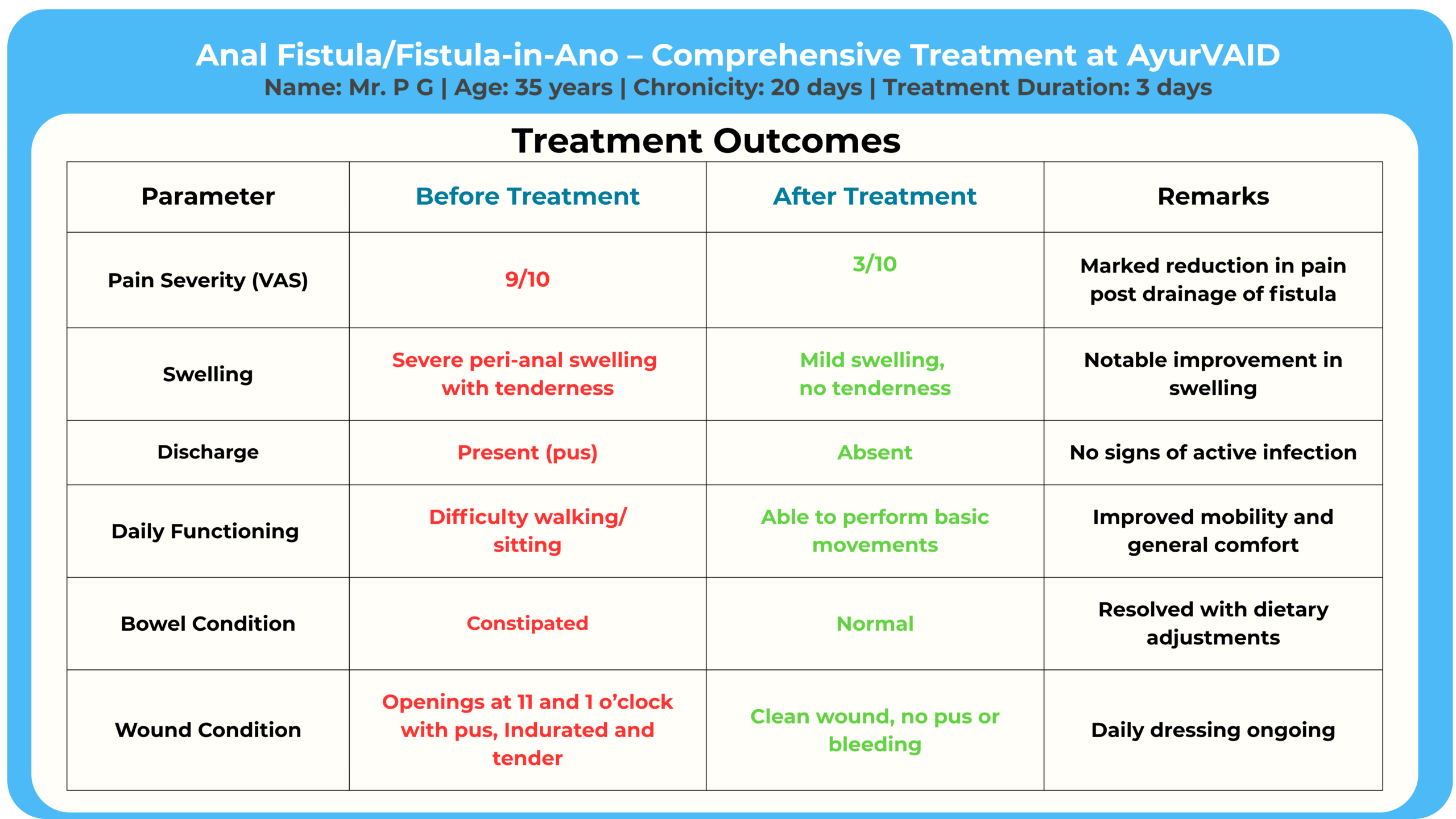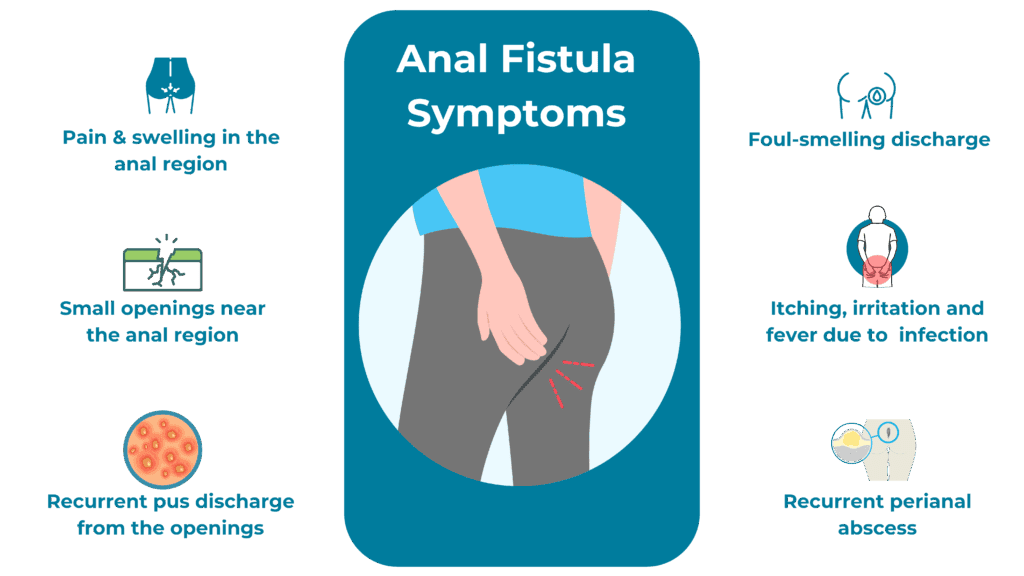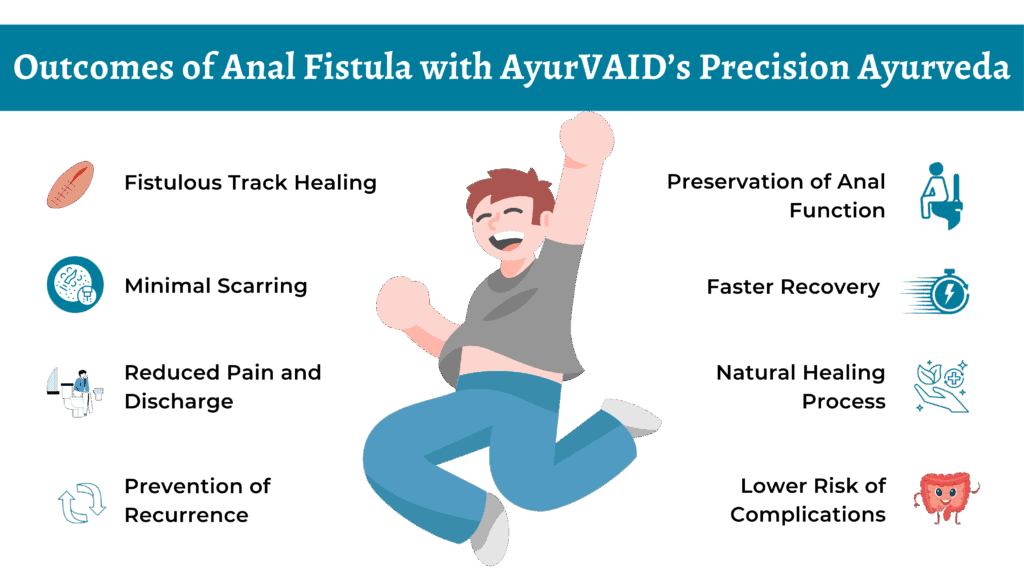- AyurVAID Pharmacy
Fistula -in-ano is characterised by a tract between the perianal skin and anal canal. The quality of life of an individual is greatly affected by this condition, which causes recurrent pus discharge, swelling, pain, and irritation. If not treated, it is prone to recurrent infections and recurrence and usually arises as a result of an untreated or prior anal abscess.
In Ayurveda, fistula-in-ano is referred to as “Bhagandara”, which is one of the eight major diseases (Ashta Mahagada), that are considered difficult to treat due to their chronic and relapsing nature. The term Bhagandara is derived from “Bhaga” (perineum) and “Darana” (tearing or breaking), indicating the pathological tearing of the Bhaga (perineum), guda (anal region) and vasthi (bladder region). When it is in a blister stage, it is called Pidaka, and if it is ripened (pakwa avastha). It is called Bhagandara (fistula). The causative factors in Ayurveda include impaired Agni (digestive fire), accumulation of Ama (toxins), and vitiation of doshas, especially Vata and Pitta, leading to suppuration, abscess formation, and tract development.
Apollo AyurVAID adopts an integrated, individual, and protocol-driven approach (Precision Ayurveda), addressing the root causes of piles rather than merely suppressing its symptoms.
A whole-person health assessment by an expert team of Ayurveda physicians is conducted to design a personalised treatment protocol. This includes classical Ayurveda medications and therapies, targeted anorectal care, and individualised diet and lifestyle modifications.
The treatment protocol includes classical Ayurvedic medications to correct the deranged Agni and dosha’s, reduce inflammation, and promote tissue healing. If the tract is chronic or complex, specialized Ayurvedic para-surgical procedures such as Ksharasutra therapy — a medicated thread ligation technique — are used. This method gradually cuts, and heals the fistulous tract, there by reducing the chance of recurrence. Along with Ksharasutra therapy, the treatment plan also includes personalized diet advice, bowel regulation strategies, and lifestyle modifications to strengthen digestive health, support immunity, and prevent future aggravation.
The integrative and multidisciplinary care at Apollo AyurVAID not only manages the symptoms but ensures sustainable healing and long-term relief from fistula-in-ano.



Ayurveda explains Bhagandara (Anal Fistula) as a disease of guda(anorectal region) which is caused by the imbalance of the doshas like vata, pitta, and kapha, that leads to the dushti of raka, mamsa, and medo dhatu.
Acharya’s explain it as a complication of untreated parikartika (fissure in ano) and Pidaka (abscess/boil), which further leads to Bhagandara (Anal Fistula). And the causes can be broadly classified as Aharaja, Viharaja nidanas, and due to preexisting conditions.
The conventional medicine explains Anal Fistula as a result of cryptoglandular infection, ie, infection of the anal glands, leading to abscess formation, which, when does not heal completely causing Anal Fistula. Also, the risk factors include dietary and lifestyle causes.
Common symptoms:

Acharya Susrutha explains 5 different types of bhagandara based on the dosha involvement
Vataja type:
Pittaja type:
Kaphaja type:
Combination of Vata, Pitta and Kapha (Sannipataja type):
Agantuja (Due to external trauma):

1. Whole-Person Health Assessment
Conducted by our specially trained doctors, this assessment includes an in-depth evaluation of present and past complaints, Nidana Panchaka (causative factors), and disease pathways using clinical methods such as Ashta Sthana Pariksha (8-fold examination), Dasha Vidha Pariksha (10 factors), and Srota Pariksha, along with clinical examination (proctoscopic examination). The assessment encompasses a comprehensive medical history, which includes any associated conditions such as constipation, liver disorders, or pregnancy. Advanced diagnostic procedures may include colonoscopy or sigmoidoscopy to rule out other conditions when clinically indicated.
2. Disease Tree
A comprehensive disease tree, from root cause to all signs and symptoms, is derived from causative factors, imbalances in doshas, involved sub-systems, and progression.
3. Personalised Protocol-Based Care Plan
Based on the disease tree and assessments, we create:
Yoga and exercise recommendations specific to piles management
4. Disease Monitoring and Outcomes Tracking
The Perianal Disease Activity Index (PDAI) and Visual Analogue Scale (VAS) are the scales used to monitor treatment success and disease progression.
The assessment parameter includes fistuolus discharge, pain and restriction of activities, sexual activity restriction, degree of induration, and functional assessment to gauge overall well-being.

Primary Aims:
Treatment Regimen:
1. Internal Medicine:
2. External Therapies:
3. Dietary Modifications:
Key Goals:
Treatment Protocol:
1. Specialised Procedures:
2. Panchakarma Therapies:
Anal Fistula Treatment in Ayurveda incorporating Panchakarma treatment is beneficial during the initial grade (Grade I and II) of bhagandara (Anal Fistula), when the symptoms are confined to bleeding, pain, and intermittent pus discharge. Specific Vasti treatments (Matra Vasti) for healing and fortifying Abhyanga with special oils for enhancing circulation are also administered post ksharasutra therapy.
3. Advanced Internal Medicines:
Clinically effective proven medicines, Rasayana preparations for regeneration of tissues, Specific dosha predominance-based combinations

Primary Objectives:
Treatment Protocol:
1. Rasayana Therapy:
Tissue-specific rejuvenative medicines
Immunomodulatory herbs to avoid infections
Digestive tonics for long-term maintenance of Agni
2. Lifestyle Integration:
Disciplined exercise regimen including yoga asanas
Techniques of stress management and meditation
Planned long-term diet and counselling
Follow-up and monitoring policies on a regular basis
3.Preventive Measures:
Bowel training and good defecation techniques
Occupational changes for risky occupations
Seasonal diet changes
Promoting regular detoxification
Case 1: A 48-year-old female with chronic Fistula-in-Ano (Bhagandara)
Case Summary:
The patient had been experiencing pain in the anal region with pus and blood-mixed discharge for 2–3 months. She previously consulted multiple doctors and was treated with medications, but symptoms recurred. TRUS (Transrectal Ultrasound) confirmed a complex fistulous tract with abscess and cephalad extension. She also had second-degree hemorrhoids.
She underwent a 3-day inpatient Ayurveda treatment involving Kshara Karma for hemorrhoids and fistula tract management, including abscess drainage and external wound widening. The treatment was supported by internal herbal medications and dietary modifications.
At discharge, the patient reported significant relief: no bleeding or discharge, normal bowel and bladder function, and improved general condition. Continued wound care and dressing were prescribed for 15 days.
Case 2: A 12-year-old boy with chronic anal ulcer and Fistula-in-Ano (Bhagandara, Dushtavrana)
Case Summary:
The patient presented with a 7-month history of a non-healing ulcer near the right side of the anus, painful defecation, and bloody pus discharge. Symptoms were aggravated while sitting and during bowel movements. Despite 4 months of allopathic treatment, there was no significant relief. He approached AyurVAID for root cause management. Clinical examination and MRI confirmed a low-type transsphincteric fistula and a suspicious intersphincteric tract, with signs suggestive of Crohn’s disease from a CT scan.
He underwent a structured Ayurveda regimen spanning multiple therapies over several weeks, including Snehapana, Abhyanga, Bashpa Sweda, Virechana, and Takradhara, along with internal medications.
By the end of the treatment, ulceration severity reduced from 7/10 to 2/10, pain reduced from 5/10 to 2/10, gas formation and indigestion resolved completely, and his overall wellbeing improved from 3/5 to 4/5. The patient completed treatment without adverse effects. Continued internal medications, dietary restrictions, and lifestyle modifications were prescribed.
Clinical Evaluation of Kshara Sutra Therapy in the Management of Bhagandara (Fistula-in-Ano): A Prospective Study; 2007, Research Article: A prospective study of 50 patients treated with Ksharasutra at CCRAS, New Delhi, showing only 5.88% recurrence and minimal sphincteric damage over 18 months.
Comparative Clinical Study of Guggulu-Based Ksharasutra with and without Partial Fistulectomy in Management of Bhagandara; 2018, Research Article: Randomized trial (n=42) comparing Guggulu-based Ksharasutra alone versus with partial fistulectomy, demonstrating faster symptom relief and lower unit cutting time in the combined approach.
A Randomized Open-Labelled Controlled Clinical Study of Udumbar Ksharasutra and Snuhi Ksharasutra versus Apamarga Ksharasutra in Bhagandara”; 2019, Research Article: Thirty patients randomized to Udumbar, Snuhi, or Apamarga Ksharasutra groups; Udumbar formulation yielded the fastest unit cutting time and best symptom relief.
A Randomized Controlled Clinical Trial Comparing Koshataki Ksharasutra with Apamarga Ksharasutra in Bhagandara Management; 2025, Research Article: Forty participants treated with either Luffa acutangula–based or Achyranthus aspera–based Ksharasutra, showing comparable healing times but superior patient comfort with Koshataki thread.
Complex Anal Fistula Treated with IFTAK (Interception of Fistulous Tract with Application of Ksharasutra): A Case Report”; 2023, Case Study: A complex cryptoglandular fistula managed by IFTAK under EAUS guidance, achieving complete healing without incontinence and no recurrence at 4-month follow-up.
“I had recurrent anal fistula and even underwent three surgeries, but the problem kept coming back.
I turned to Apollo AyurVAID and consulted Dr. Kalpita Thakre, who listened
carefully to my history and conducted thorough scans. After her Ayurvedic treatment, my condition improved
drastically—I can now sit, walk, and sleep comfortably, and feel confident that there will be no recurrence.
I am truly grateful for the skill and compassionate care at Apollo AyurVAID, and highly recommend them to
anyone with similar issues.”
Mr. PG, 35 years
As we work hard to improve our services, your feedback is important to us. Please take a moment to help us serve you better.
The information provided in this blog is for general informational purposes only and is not intended as a substitute for professional medical advice, diagnosis, or treatment. Always seek the advice of your physician, Ayurvedic practitioner, or other qualified healthcare provider with any questions you may have regarding a medical condition or treatment.
Subscribe to our hospital newsletter for the latest health tips, updates on services, patient stories, and community events. Sign up today and stay informed!



Popular Searches: DiseasesTreatmentsDoctorsHospitalsWhole person careRefer a patientInsurance